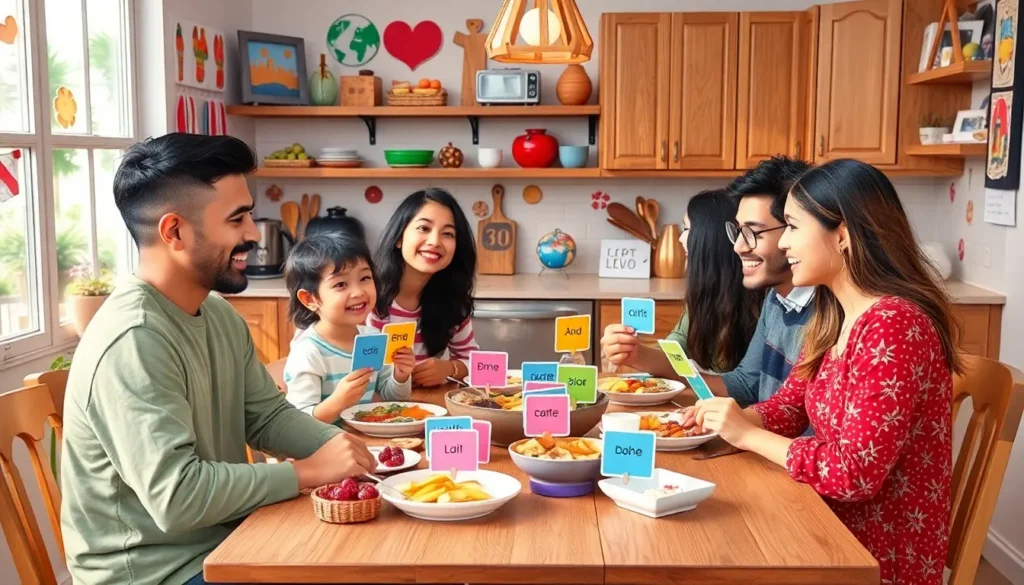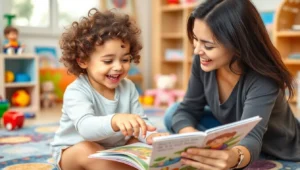Table of Contents
ToggleIn today’s globalized world, mastering a new language isn’t just a skill; it’s a family affair. Imagine your household buzzing with conversations in Spanish, French, or Mandarin, where even the dog learns a few commands in a second language. Language learning can transform ordinary family time into a fun-filled adventure, complete with laughter, cultural discoveries, and maybe even a little friendly competition over who can roll their R’s the best.
Understanding Language Learning Family
Language learning within a family setting fosters a dynamic environment for personal growth and cultural appreciation. Families share the journey of acquiring new languages, enhancing relationships through mutual support and collaboration.
Definition and Concept
Language learning family refers to a household that actively engages in acquiring new languages together. It encompasses all family members participating in this journey, enriching their communication skills while discovering diverse cultures. Interaction in multiple languages promotes a sense of belonging and shared exploration, transforming the educational process into a fun and engaging activity. Each family member contributes unique strengths, creating a well-rounded learning experience.
Importance in Modern Society
Language skills hold significant value in today’s interconnected world. They enhance job opportunities and improve the ability to connect with people from different backgrounds. Families that prioritize language learning cultivate cultural awareness, preparing children for future challenges in a global landscape. Furthermore, shared language experiences encourage empathy and understanding, bridging gaps between generations. Engaging in language acquisition together strengthens familial bonds while promoting lifelong learning.
Benefits of Being a Language Learning Family


Being a language learning family brings numerous advantages that extend beyond just acquiring new words. Engaging collectively in language study enhances everyday experiences and creates opportunities for growth.
Cognitive Advantages for Children
Children in multilingual environments experience cognitive benefits. Research shows that bilingualism improves problem-solving skills and critical thinking. Cognitive flexibility increases through navigating different languages. Enhanced memory capacity also becomes evident, as children retain vocabulary and grammar rules more effectively. Language learning stimulates brain development, leading to better academic performance. Engaging with various cultures fosters open-mindedness and adaptability in children. They develop a more profound understanding of diverse perspectives, equipping them with essential skills for the globalized world.
Strengthened Family Bonds
Language learning fosters stronger connections among family members. Shared goals unite relatives as they embark on this journey together. Conversations in a new language encourage frequent interactions, promoting communication skills. Family members support each other through challenges, creating a nurturing environment. Engaging in fun activities, like games or cooking recipes in another language, further enhances togetherness. Celebrating milestones strengthens relationships and builds shared memories. A culture of collaboration emerges, cultivating empathy and respect for one another. The experience ultimately transforms language learning into a love for continuous education.
Effective Strategies for Language Learning
Creating an environment rich in language facilitates easier acquisition. Surrounding family members with diverse linguistic resources sparks curiosity and motivation. Labeling household items in target languages provides immediate context. Conversation starters in multiple languages encourage engagement during family dinners. Frequent exposure to different languages fosters familiarity and boosts confidence.
Engaging activities and resources enhance the learning experience. Utilizing language apps and online platforms makes learning interactive and fun. Storybooks in various languages captivate attention and expand vocabulary. Incorporating music and films adds an enjoyable dimension, combining entertainment with education. Participating in language exchange meetups presents real-world practice opportunities. Engaging in games and challenges nurtures a sense of companionship while reinforcing language skills.
Challenges Faced by Language Learning Families
Language learning families encounter several challenges that can test their commitment to multilingualism. These difficulties, while common, offer opportunities for growth and resilience in language acquisition.
Balancing Multiple Languages
Managing multiple languages can create confusion within a family. Different members might favor one language over another, leading to inconsistency in practice. Ensuring equal exposure to all languages promotes proficiency for everyone. Prioritizing structured practice times helps guide efforts effectively. Family activities can incorporate various languages to enhance engagement. For example, setting language days or themed dinners fosters a playful atmosphere, encouraging members to communicate in the target languages consistently. Using language resources in daily routines strengthens familiarity without overwhelming learners.
Overcoming Initial Hurdles
Starting the language learning journey presents several initial hurdles. Anxiety about making mistakes often discourages family members from speaking freely. Encouragement and support are crucial during this phase, as they build confidence. Creating a non-judgmental environment allows for open communication. Establishing realistic goals sets a clear path for progress. Celebrating small victories from vocabulary retention to successful conversations motivates learners to continue moving forward. Utilizing games and interactive activities can transform tiring practice into enjoyable experiences, reinforcing commitment to the shared objective of multilingualism.
Embracing language learning as a family opens doors to a world of opportunities. It not only enhances communication but also fosters a deep appreciation for diverse cultures. Families that engage in this journey together create a supportive environment where everyone grows and learns.
The shared experiences and challenges faced in acquiring new languages strengthen familial bonds. As family members celebrate milestones and support one another, they cultivate empathy and respect. This collective endeavor transforms language learning into a lifelong passion that enriches both personal and family life.
By prioritizing language skills, families equip themselves with essential tools for navigating an increasingly interconnected world. The journey of a language learning family is not just about words; it’s about connection, understanding, and shared adventures.





